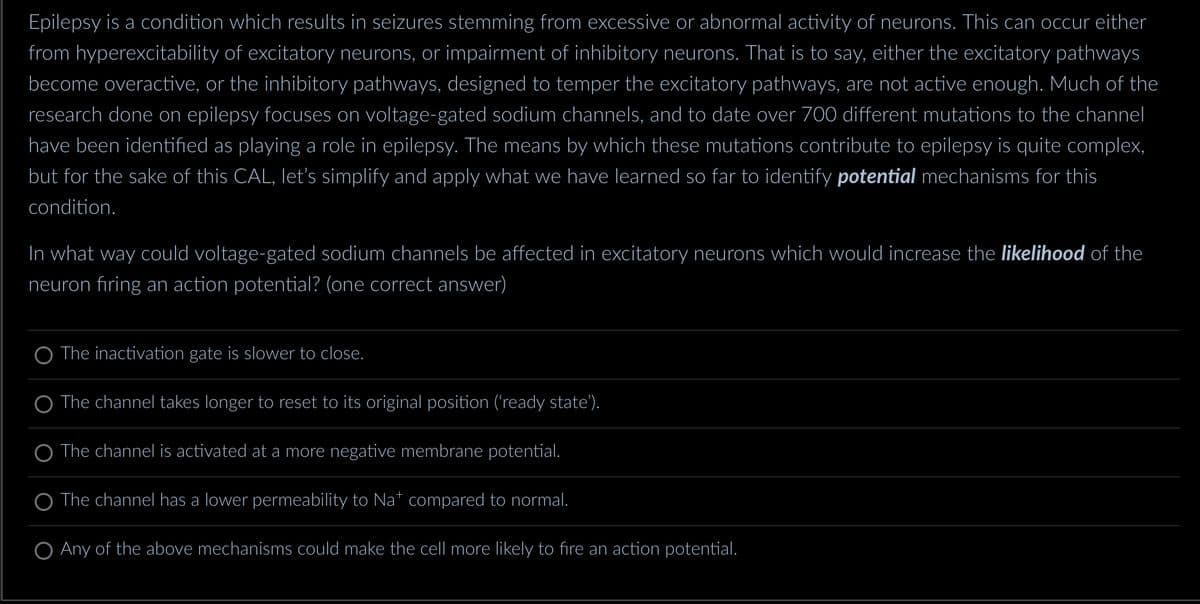Epilepsy is a condition which results in seizures stemming from excessive or abnormal activity of neurons. This can occur either from hyperexcitability of excitatory neurons, or impairment of inhibitory neurons. That is to say, either the excitatory pathways become overactive, or the inhibitory pathways, designed to temper the excitatory pathways, are not active enough. Much of the research done on epilepsy focuses on voltage-gated sodium channels, and to date over 700 different mutations to the channel have been identified as playing a role in epilepsy. The means by which these mutations contribute to epilepsy is quite complex, but for the sake of this CAL, let's simplify and apply what we have learned so far to identify potential mechanisms for this condition. In what way could voltage-gated sodium channels be affected in excitatory neurons which would increase the likelihood of the neuron firing an action potential? (one correct answer) The inactivation gate is slower to close. The channel takes longer to reset to its original position ('ready state'). The channel is activated at a more negative membrane potential. O The channel has a lower permeability to Nat compared to normal. O Any of the above mechanisms could make the cell more likely to fire an action potential.
Epilepsy is a condition which results in seizures stemming from excessive or abnormal activity of neurons. This can occur either from hyperexcitability of excitatory neurons, or impairment of inhibitory neurons. That is to say, either the excitatory pathways become overactive, or the inhibitory pathways, designed to temper the excitatory pathways, are not active enough. Much of the research done on epilepsy focuses on voltage-gated sodium channels, and to date over 700 different mutations to the channel have been identified as playing a role in epilepsy. The means by which these mutations contribute to epilepsy is quite complex, but for the sake of this CAL, let's simplify and apply what we have learned so far to identify potential mechanisms for this condition. In what way could voltage-gated sodium channels be affected in excitatory neurons which would increase the likelihood of the neuron firing an action potential? (one correct answer) The inactivation gate is slower to close. The channel takes longer to reset to its original position ('ready state'). The channel is activated at a more negative membrane potential. O The channel has a lower permeability to Nat compared to normal. O Any of the above mechanisms could make the cell more likely to fire an action potential.
Human Physiology: From Cells to Systems (MindTap Course List)
9th Edition
ISBN:9781285866932
Author:Lauralee Sherwood
Publisher:Lauralee Sherwood
Chapter4: Principles Of Neural And Hormonal Communication
Section: Chapter Questions
Problem 4TAHL: Assume presynaptic excitatory neuron A terminates on a postsynaptic cell near the axon hillock and...
Related questions
Question

Transcribed Image Text:Epilepsy is a condition which results in seizures stemming from excessive or abnormal activity of neurons. This can occur either
from hyperexcitability of excitatory neurons, or impairment of inhibitory neurons. That is to say, either the excitatory pathways
become overactive, or the inhibitory pathways, designed to temper the excitatory pathways, are not active enough. Much of the
research done on epilepsy focuses on voltage-gated sodium channels, and to date over 700 different mutations to the channel
have been identified as playing a role in epilepsy. The means by which these mutations contribute to epilepsy is quite complex,
but for the sake of this CAL, let's simplify and apply what we have learned so far to identify potential mechanisms for this
condition.
In what way could voltage-gated sodium channels be affected in excitatory neurons which would increase the likelihood of the
neuron firing an action potential? (one correct answer)
The inactivation gate is slower to close.
The channel takes longer to reset to its original position ('ready state').
O The channel is activated at a more negative membrane potential.
The channel has a lower permeability to Na* compared to normal.
O Any of the above mechanisms could make the cell more likely to fire an action potential.

Transcribed Image Text:In what way could voltage-gated sodium channels be affected in excitatory neurons which would increase the maximum action
potential firing frequency? Hint: consider carefully what determines the duration of the absolute refractory period. (one correct
answer)
The inactivation gate closes sooner/more quickly.
The activation gate opens more slowly.
O The channel has a lower permeability to Na* compared to normal.
O Any of the above mechanisms could result in a higher maximum firing frequency.
Expert Solution
This question has been solved!
Explore an expertly crafted, step-by-step solution for a thorough understanding of key concepts.
Step by step
Solved in 3 steps

Knowledge Booster
Learn more about
Need a deep-dive on the concept behind this application? Look no further. Learn more about this topic, biology and related others by exploring similar questions and additional content below.Recommended textbooks for you

Human Physiology: From Cells to Systems (MindTap …
Biology
ISBN:
9781285866932
Author:
Lauralee Sherwood
Publisher:
Cengage Learning

Human Physiology: From Cells to Systems (MindTap …
Biology
ISBN:
9781285866932
Author:
Lauralee Sherwood
Publisher:
Cengage Learning